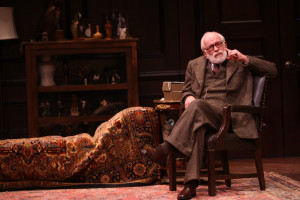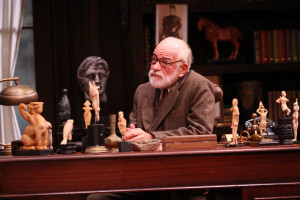Arts Week
Freud’s Last Session Explores Gray Areas with Depth and Warmth
Good versus evil. Black versus white. Atheist versus believer. Playwright Mark St. Germaine sets us up in Freud’s Last Session (now at the Cape Playhouse in Dennis) to believe that we’re about to witness the extremes doing battle; what the audience doesn’t reckon with is the characters’ understanding and exploration of the gray areas between the two.
 We are in Sigmund Freud’s London study (and anyone who loves books and learning is going to covet Nicholas Dorr‘s set immediately). The psychoanalyst has fled Vienna and on this morning is pondering his own death—which he will soon hasten—as well as Germany’s invasion of Poland. He is about to be visited by an Oxford don, Clive Staples Lewis, who at one time shared Freud’s atheism but has recently converted to Anglican Christianity. Lewis has criticized Freud in print and fears that he’s been invited here to be given a dressing-down from the great man.
We are in Sigmund Freud’s London study (and anyone who loves books and learning is going to covet Nicholas Dorr‘s set immediately). The psychoanalyst has fled Vienna and on this morning is pondering his own death—which he will soon hasten—as well as Germany’s invasion of Poland. He is about to be visited by an Oxford don, Clive Staples Lewis, who at one time shared Freud’s atheism but has recently converted to Anglican Christianity. Lewis has criticized Freud in print and fears that he’s been invited here to be given a dressing-down from the great man.
St. Germaine’s choice of these two real personalities for his fictional conversation is enlightened: while modern audiences know Lewis primarily as the author of recently re-popularized children’s books, he was in fact after his conversion a lay theologian, not blindly accepting of dogma but rather bringing his incisive mind to wrestle with the problems presented by faith.
What is immediately a little disconcerting in the opening scene is the sense that one is, actually, in the presence of Freud himself. Kenneth Tigar—who comes to the Cape Playhouse having already performed the role at Hartford’s TheaterWorks and Geva Theatre Center—just looks like every extant photograph of the psychoanalyst. And he remains completely in the physicality of an old man throughout the play: every movement, every expression, every word is clearly that of an aged and infirm person. This is not easy to maintain and Tigar does it to perfection.
As Lewis, Jonathan Crombie—who played the role opposite Tigar in Hartford—is less like his real-life character physically, but does a good job of strongly countering the more verbally and even physically flamboyant Freud. Lewis is logical and rational, and calm—until his own defenses are stripped away during an air-raid signal—and Crombie allows both sides of the Englishman to emerge: the intellectual Oxford don and the frightened young soldier.
The actors move from epigram to epigram without missing a beat. The play is filled with bon mots, most of them Freud’s, and at one point Lewis looks pointedly at the analyst’s couch and says, “There’s no avoiding this, is there?” No: it’s clear that there isn’t.
 After a great deal of extremely entertaining sparring, the men get down to brass tacks—the problems inherent in belief. Freud dismisses the New Testament: “These are myths and legends!” he exclaims, while Lewis calmly counters, “But does that make them lies?” He presses his point: the New Testament cannot be only comprised of myths, he says, it’s simply not imaginative enough. Freud has the last word: “You’re convinced of Christ’s existence because of bad storytelling?”
After a great deal of extremely entertaining sparring, the men get down to brass tacks—the problems inherent in belief. Freud dismisses the New Testament: “These are myths and legends!” he exclaims, while Lewis calmly counters, “But does that make them lies?” He presses his point: the New Testament cannot be only comprised of myths, he says, it’s simply not imaginative enough. Freud has the last word: “You’re convinced of Christ’s existence because of bad storytelling?”
The situation is, of course, absurd on one level: the play is punctuated by the war that is just beginning: Neville Chamberlain and King George’s voices on the radio, an aborted air raid, the seizing of gas masks. Freud uses the situation to attack the Gospel message once more: “Should Poland turn the other cheek?” he demands.
The men discuss sexuality, the dynamic that lies at the center of Freud’s worldview; they remain distanced from each other in their beliefs but as the play draws to a conclusion there is the predictable personal rapprochement, enabled by Freud’s sudden painful physical crisis and the need for an immediate intimate connection. Each admits finally to his own weakness and Lewis ruefully remarks, “It was madness to think we could solve the world’s problems in one morning,” to which Freud responds, “The greater madness is not to think of it at all.”
Geva Theatre Center’s Skip Greer‘s direction is light and never goes over the top into too much confrontation, too much pathos, or too much of any strong emotion for that matter. He allows the audience the play’s moments of humor that balance the serious issues under debate but then with a deft hand pulls back into the flow of the conversation.
A lifelong admirer of Lewis’, I left this performance moved and thoughtful. Anyone with an interest in the gray areas between religion and atheism will find enough here to occupy their thoughts long after the play is over—which is, after all, one of the reasons one goes to the theater: to be challenged in an entertaining way. The Cape Playhouse’s production of Freud’s Last Session does just that.
***
Jeannette de Beauvoir is the host of Arts Week on WOMR, a contributing writer to Provincetown Magazine, and a novelist, editor, and marketing writer. More about her at linkedin.com/in/jeannettedebeauvoir












